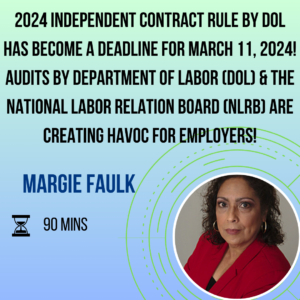Marketing and Empathy Psychology
Legal & Ethical Challenges for Employers: An Increase In Burnout, Stress, & Mental Illness
By - Dr. Susan Strauss RN Ed.D.
Lorem ipsum dolor sit amet, consectetur adipiscing elit. Ut elit tellus, luctus nec ullamcorper mattis, pulvinar dapibus leo.
- 06 Aug - 21 Oct 2022
- 10:00 - 12:00
- January 22, 2024 | 1:00 pm (EST) |
- 120

Overview:
Employers are seeing more mental health issues in their workforce than ever before. Long COVID has enhanced mental health concerns even more. Each year 1 in 5 adults is stricken with a mental illness (National Institute of Mental health), making mental illness an everyday reality for many of your employees. Yet only 1 in 3 people seek help with their illness. The ADA, HIPPA, FMLA and most states’ human/civil rights department dictate how employers deal with employees with mental health problems and could charge employers with civil rights liability. Privacy laws create challenges for employers to determine how serious a situation is and whether an employee poses a danger (though those with a mental illness pose no more risk of violence than those without a mental illness). Two thirds of employees would take a pay cut for a job that supports mental health – do you? As a manager, what can you do to better recognize and take care of your employees’ mental health? Seventy percent of employees could do more to support their employees’ mental health according to the Society of Human Rights Management (SHRM, February 15, 2023).
Examples of the most common psychological disorders include major depression and dysthymia, bipolar disorder, anxiety, schizophrenia, and an array of personality disorders. Those individuals with depression have 2.5 times the risk of on-the-job injury. Workplace depression results in 200 million lost days annually. The disease is common, debilitating, and the number one cause of disability worldwide. Employers lose an estimated $52 billion annually in loss of productivity and insurance payments. It is worth your time as an employer to do all you can to support the psychological health and well-being of your employees.
With the increase in claims came an EEOC 2023 newly released Guidance on Mental Health Discrimination which is addressed to employees informing them of their employment rights under the ADA. Workplaces can and should play a significant role in minimizing their employees’ mental health risks. Employee stress levels continue to rise as more and more employees spend more and more hours at work without an increase in pay or benefits. Burnout and depression, particularly to millennials and millennial women, report these conditions more than any other generation.
Learning Objectives:
- To differentiate mental health from mental illness
- To discuss the most frequent mental health conditions with emphasis on depression, anxiety, and personality disorders
- To identify the demographic groups most at risk for mental health issues
- To examine the myths of mental illness
- To list signs of possible mental health issues in the workplace
- To explore the costs of mental illness to U.S. businesses
- To list prevention strategies to enhance employees’ mental health
- To discuss management’s role in both the prevention AND intervention strategies to deal with mental health in your workplace
Who Will Benefit:
CEO, COO, CFO, directors, Managers, supervisor, HR, risk management, OSHA professionals, Occupational health nurse
Vulputate eros arcu magnis donec sem pretium scelerisque a etiam. Eros aliquam elit si mattis phasellus at orci letius ligula posuere. Sodales maecenas facilisis diam egestas dictumst si fames mus fermentum conubia curabitur. Ornare nisi consectetur semper justo faucibus eget erat velit rhoncus morbi.
Speaker Detail

Dr. Susan Strauss RN Ed.D.
Dr. Susan Strauss is a national and international speaker, trainer and consultant. Her specialty areas include management/leadership development, organization development, communication, and harassment and bullying. She trains and consults with business, education, healthcare, law, and government organizations from both the public and private sector. She has been an adjunct professor at several universities. Dr. Strauss has authored over 30 book chapters, books, and articles in professional journals. She has been featured on 20/20, CBS Evening News, and other television and radio programs as well as interviewed for newspaper and journal articles. She is a Registered Nurse, has a master’s degree in Health Sciences and a doctorate in organizational leadership.
Webinar Information
- Duration : 120
- Date / Time(EST) : January 22, 2024 | 1:00 pm
- 06 Aug - 21 Oct 2022
- 10:00 - 12:00
- Jakarta, Indonesia
Share this event
Related products
-

Garnishments and Proper Processing
$199.00 – $349.00 Select options This product has multiple variants. The options may be chosen on the product page -

2024 Independant Contractor New DOL Rule
$249.00 – $399.00 Select options This product has multiple variants. The options may be chosen on the product page -

Investigating ADA, FMLA, and Worker’s Comp Abuse
$199.00 – $349.00 Select options This product has multiple variants. The options may be chosen on the product page -

How to Use ChatGPT for Business
$199.00 – $349.00 Select options This product has multiple variants. The options may be chosen on the product page



